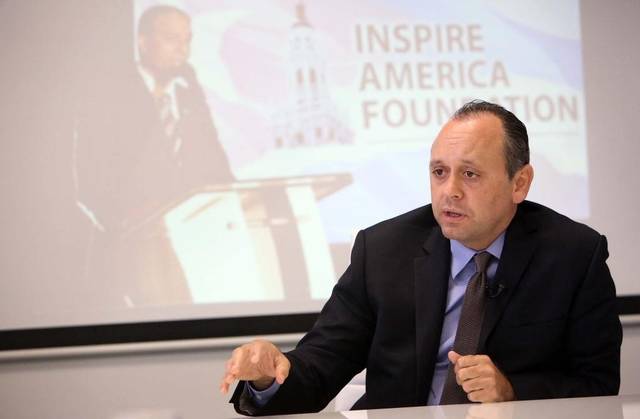
New foundation, old Ideas
A group of Cuban exiles in Miami recently announced the creation of a new foundation, the Inspire America Foundation. It’s a new organization with really old ideas.
In a September 4 story, The Miami Herald reported on the organization’s inaugural event, which allegedly drew 700 guests. What is the mission of this new group? “We are categorically opposed to negotiations,” Marcell Felipe (in photo at top), the foundation’s president, told the Miami Herald.
That rhetoric has the word anachronism written all over it. Categorical opposition to negotiations between all parties—the U.S. and Cuba, exiles and the Cuban government, you name it—has always been the hallmark of the hardliners. What’s new about that? And what part of this agenda could inspire Americans, most of whom support the opening to Cuba and for whom the Cuba issue doesn’t register even as a tiny blip on the radar screen?
Ladies and gentlemen of the ancient school, all 700 of you, the ship has already sailed. Not only have there been extensive negotiations lasting years between the U.S, and Cuban governments, these negotiations have resulted in your worst nightmare: the reestablishment of diplomatic relations between the two countries as part of a more general thaw.
Moreover, the hardliners, from the little fish cackling endlessly on the radio in Miami to the watchful sharks circling in Congress, confident in their power to tear apart any proposal for a change in U.S. Cuba policy, were not even informed about the talks, much less consulted or invited to participate. Game. Set. Match. You are history.
Anachronistic and delusionary too is the new foundation’s other principal goal, uniting the exile. That objective has been proclaimed since 1959, but never achieved.
Today Cubans are more divided than ever. Supporters and opponents of the new policy. “Historic” exiles versus new arrivals. U.S. born Cuban-Americans versus old school Cuban exiles. Republicans against a growing number of Democrats. Supporters of Donald Trump versus despisers of Trump. How are you going to unite that?
The new group claims to speak for almost all Cubans. Yet recent polls taken in Miami show the majority of Cubans here favor the new Obama approach, a shift driven mostly by new waves of Cuban immigration and new generations of Cuban-Americans born in this country. And, a poll conducted clandestinely in Cuba sponsored by a U.S. Hispanic television network found that 97 percent of people support the Obama policy.
Oblivious to the evidence, Inspire America leader Marcell Felipe believes “the immense majority of the people who live in Cuba as well as all exiles oppose any negotiations…” This too is old hat. False, grandiose statements spoken in the name of all Cubans are nothing novel. This one is a particularly brazen one since there are thousands of exiles who have openly favored negotiations for decades.
Another hoary exile theme that drives the Inspire America effort is the idea of betrayal. It goes a long way back. First, the batistiano crowd thought the U.S. betrayed them when it stopped selling weapons to Fulgencio Batista in the 1950s after it realized that the Cuban strongman was on his way out. Then, after the revolution turned radical, middle and upper class opponents of Batista spoke of “the revolution betrayed.” The Bay of Pigs was the next betrayal, with John F. Kennedy as the culprit. Hard core exiles still believe that had Kennedy carried out more bombings, the entire hare-brained scheme would have succeeded. Many others feel that the fact that the United States did not invade Cuba at the time of the Missile Crisis was another betrayal. It goes on and on. Throwing the Watergate burglars in jail: betrayal. Returning Elian to his father: betrayal. Diplomatic relations is only the latest betrayal.
Incoherence and contradiction also have always been part and parcel of exile hard core practice and rhetoric. They want to unite the Cubans but…they also want to punish recent arrivals who return to Cuba to see their families. “The key legislative proposal backed by the foundation is a change in the Cuban Adjustment Act: to revoke the residency of any Cubans that obtain it under the Act and then travel back to the island.” Good luck with that. Then, too, it’s a surefire formula for unity.
Contradiction rears its head in another area as well. The organization’s web page says it’s organized as a Super PAC. But Felipe has said the group is registered as a “non-profit, tax-exempt organization operated to promote social welfare.” Which is it, politics or social welfare? The IRS will want to know.
There is, I must confess, a sweet irony in reading that one of the foundation’s main aims is to oppose U.S. policy toward Cuba. For how long were we, who opposed the hardline policy for decades, not even afforded a hearing by “our” Cuban-American representatives in Washington?
Now the shoe is on the other foot. The current situation confirms that the tables have been turned and the hardliners are now the ones on the outside looking in. Give them this: they successfully defended an unjust and irrational policy for a generation. That’s a feat, although a very dubious one indeed.
But it’s easier to defend a fortified bunker than to take one by assault. Now it’s time for us to fortify our position. We need to help elect Hillary Clinton and, even more importantly, to pressure her relentlessly to move farther along Obama’s policy track and not take a single step back. Not one.


